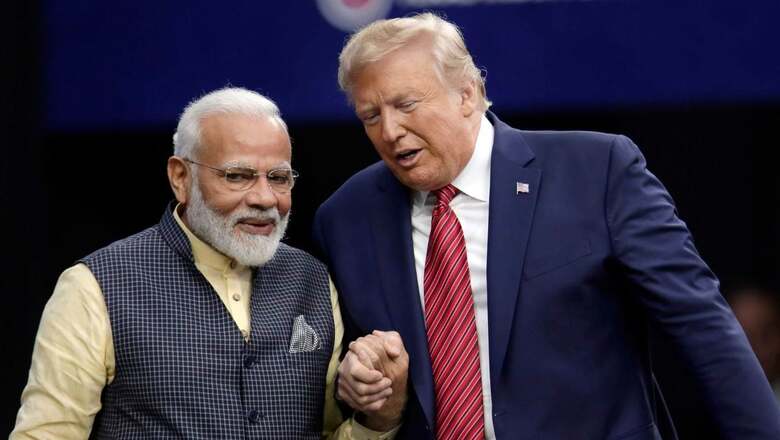
views
When Indian-origin US presidential candidate Vivek Ramaswamy opened the Republican debate on November 10 with a blistering attack on the chairperson of his own party, Ronna Romney McDaniel, and asked her to resign, the fissures within the Grand Old Party stood exposed.
McDaniel has been serving as chair of the Republican National Committee (RNC) since 2017. Ramaswamy pointed out how the member of the Romney family presided over the slide in the 2018 midterm elections, in which the Republican Party lost control of the House of Representatives to Democrats in a ‘blue wave’ election.
Then in 2020, Republicans lost, exit disgracefully with his supporters making a violent attempt to capture Capitol Hill. In the 2022 midterm elections, the Republicans narrowly regained the House but Democrats increased their majority in the Senate despite Joe Biden falling popularity.
I’m sick and tired of this Republican Establishment that has made us a party of losers. Where is the accountability for years of losing: 2018, 2020, 2022 and now last night? I’m calling on @GOPChairwoman to resign tonight. pic.twitter.com/8hxVqWGlwL— Vivek Ramaswamy (@VivekGRamaswamy) November 9, 2023
How could this happen under the leadership of a strong, mass leader like Donald Trump?
Or did they happen because of him?
Trump’s grip on the party is not total. Recent national polls show he has about 57% support of conservative voters. Rest is with other candidates. Many of Trump’s rivals see him as controversial, legally compromised and having pleaded not guilty in four criminal cases.
“From Columbus to Phoenix to the halls of Congress, the Republican Party has been stuck in a prolonged internal conflict, with power struggles and primary challenges becoming as much of a GOP staple as tax cuts and tough-on-crime rhetoric,” wrote Julie Carr Smyth and Nicholas Riccardi in AP on October 12.
After winning the Ohio House, Republicans fought bitterly among themselves over Speaker nomination. In Michigan, a senior Republican complained that a party rival kicked him in the crotch. In Texas, the Republican attorney general has threatened to press criminal charges against some of his over party members.
Across the Atlantic, Tory strongman Boris Johnson has left his party in a fractious mess. PM Rishi Sunak sacked his popular and outspoken interior minister Suella Braverman for criticising the police over handling of pro-Palestine rallies.
The Conservative Party has already changed two PMs in a year since Johnson quit in 2022 and six since it came to power in 2010. It has brought itself to the cliff-edge of defeat to Labour in the coming elections.
In contrast, PM Narendra Modi has been in power for close to 10 years now without any major internal bickering coming to the fore. Under him, the party has grown from strength to strength, the organisation has got as much attention as the government, it has expanded in areas like Bengal and Tamil Nadu which was once deemed impossible, and the core team has remained disciplined and united for the party’s cause.
How does Modi achieve this harmony between his towering status and his party’s well-being?
First, unlike Trump or Johnson, he leads by example. There has not been a single serious charge of corruption or a scandal against him in his entire public life.
Trump has multiple criminal charges against him, including paying off women he had sexual encounters with to remain silent about it. Under Johnson, Tories were hit by scandal after scandal by party leaders including Christopher Pincher, Imran Ahmad Khan and Neil Parish.
Two, Modi’s discipline and public conduct has been exemplary. He has never allowed himself to be seen as reckless. Take Covid, for example. The prime minister never dropped his mask, repeatedly exhorting the entire nation to stick to the pandemic protocol.
Trump threw caution to the wind by driving around unmasked. Johnson was caught partying during peak Covid.
Third, personalities like Trump and Johnson tend to encourage infighting and chaos in their parties to remain powerful. Modi, who was an RSS Pracharak for decades, has a very different, long-term approach to power.
He puts in almost superhuman effort to strengthen the party and grow it in every corner. He knows only a strong party base can ensure power remains with it for years. He was never in it for a one-term game. He knows that to effect far-reaching changes, one has to stay in power for decades, and to stay on for that long, one has to nourish and nurture the party organisation.
And fourth, Modi, unlike his counterparts in other countries, quietly does succession planning. He has groomed an extremely diligent, hardworking rung of leaders under him like Amit Shah, Yogi Adityanath, BL Santhosh, Nirmala Sitaraman, Smriti Irani and others.
The basic difference of outlook between the likes of Trump and Johnson and Modi is individualistic as opposed to holistic. That is what makes the BJP today the most powerful political force in a democracy.
Abhijit Majumder is a senior journalist. Views expressed in the above piece are personal and solely that of the author. They do not necessarily reflect News18’s views.




















Comments
0 comment